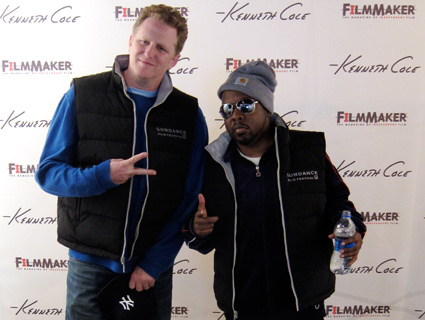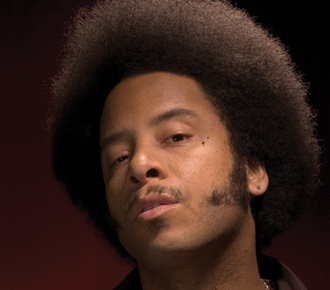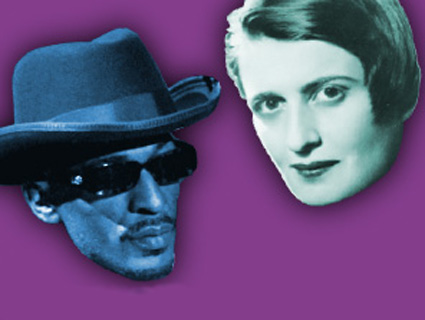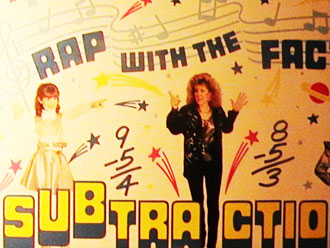
Rapaport and Phife Dawg<a href= "http://chumpchampion.com/">chumpchampion</a>/Flickr
Actor Michael Rapaport, whose face you might recognize from TV shows like Friends, Boston Public, and Prison Break (and whose tough-guy drawl your kids might know from video games like Grand Theft Auto and Scarface: The World is Yours), recalls with infectious enthusiasm the first time he heard A Tribe Called Quest. “It was on the radio in ’87 or ’88. I heard [front man] Q-Tip on the Jungle Brothers song promo, and I was like, “Oh shit, that’s A Tribe Called Quest!….The flow was so playful and adolescent.”
Rapaport, already a hip-hop fan, was an instant convert. He began following the group (hereafter abbreviated ATCQ) almost religiously as it took off over the next decade before disbanding in 1998. In 2008, presented with the chance to direct a documentary about the group, Rapaport leaped. The compelling result, Beats, Rhymes & Life: The Travels of A Tribe Called Quest, which opens in select theaters July 8, is part homage to Rapaport’s musical heroes and part dissection of the group’s tumultuous dynamics.
But things got messy this past December, after the band received a copy of the final cut and Q-Tip tweeted: “I am not in support of the a tribe called quest documentary.” Of Tribe’s four members, only Phife Dawg showed up for the film’s January premiere at Sundance. In March, the other three—Q-Tip, Ali Shaheed Muhammad, and Jarobi White—went on MTV to voice their displeasure over Rapaport’s refusal to grant them producer credits and his disregard of their editorial input. For all the drama, Rapaport seemed nothing but upbeat as we sat down in a San Francisco hotel conference room to talk about growing up hip-hop, the rift with Q-Tip, and the type of music he won’t let his kids listen to.
Mother Jones: Up until this point, you’ve only acted. What made you want to try your hand at directing?
Michael Rapaport: I’ve wanted to direct a movie for like the last 10 years. I’m fascinated by directing. When ATCQ broke up, I said somebody should do a documentary on them. And when I’d see Q-Tip—whom I know a little bit—I’d always say, “Is the Tribe gonna make more music?” I wasn’t satisfied with them not making music. In 2006, they performed in L.A. There was such a great vibe backstage, and it reminded me of those photos you see of Jimi Hendrix and Janis Joplin and Bob Dylan when they were young. And that night, I was like, I’m going to do a documentary about ATCQ. I didn’t get it together in 2006, but in 2008, I found out they were headlining the “Rock the Bells” tour, and I reached out. And it was literally like, on a Monday I asked and then on Saturday I started shooting the movie.
MJ: You’ve said that you wanted to portray the group in a positive light. Was it a challenge balancing that with making sure you offered an accurate representation?
MR: Positive doesn’t mean unflawed: It means human and vulnerable. If you make a film and you’re portraying the subject with respect, you’re gonna do it in an honest way. Were there certain things that I didn’t feel were dignified enough to make it into the movie? Yeah. Were there certain things where it got over the top and there’s too much information? Yeah. But what they did musically and for the fans was what was going to set the tone.
MJ: What do you make of all this controversy around the film?
MR: It’s disappointing. It’s frustrating. I think it’s completely unnecessary. I had to get to a point where I was like, “I’m making the movie that I want to make. I’m telling the story that I want to tell. And just because I’m making the movie about you, I’m not making the movie for you.” That’s an important thing. I didn’t make this movie for ATCQ. I made this movie for myself and because I’m a fan. I wasn’t a hired gun. I sought them out; they didn’t seek me out to direct this film. Because if they were seeking out a director, I wouldn’t be the person they’d come to. They’d go to probably a more-established filmmaker. I didn’t make this movie to appease Q-Tip.
MJ: What were the terms that you and the Tribe agreed to? Q-Tip claimed that they included the band members being named as producers.
MR: That’s not true. They never brought it up in 2 1/2 years. Never. I’ll go to court, I’ll swear on a stack of Bibles. Then, on December 19, they said, we’re ready to sign off but we want producer credit, which I thought wasn’t kosher. Because number one, they didn’t produce the movie. Number two: Documentary subjects, most of the time—and in the kind of documentary I was trying to do and that I did—shouldn’t be the producers.
MJ: But the group is now listed as a producer.
MR: Because I got into all this other shit. I said, “You want your producer credits. Here, take your producer credits.” It doesn’t change any of the control. It doesn’t change anything.
MJ: How’s your relationship like with the band these days?
MR: I had an email exchange with Q-Tip about two months ago, but Sundance was the last time I spoke to him on the phone. I saw Ali at the Tribeca Film Festival—didn’t really talk to him. Phife is coming in today—we’re cool. I haven’t talked to Jarobi since the first time I screened the movie for him.
MJ: So what are the odds that ATCQ will make more music?
MR: Based on everything I know, and I know a lot, I’d say ATCQ is not going to make more music. Do I think they could? Absolutely. Do I think would be very exciting? Absolutely. I think it would be as exciting for hip-hop fans if ATCQ made a full album as for classic-rock fans if Led Zeppelin made an album. ATCQ, De La Soul, Public Enemy, Big Daddy Kane—they’re as important to us as Jimi Hendrix. When a lost Jimi Hendrix album comes out, people buy that shit. It’s the same thing. If some Tribe shit, some good Tribe shit from 1991, came out that was not used, people would be curious what the fuck it is. Not to say it’s gonna sell a million records, but fans would be excited. And if it’s good it will sell a lot. Or it will get bootlegged a lot. Or stolen a lot.
MJ: So how did a white Jewish boy like you get into hip-hop?
MR: My father was a program director at a radio station in New York City in the ’70s. It was called WKTU Mellow 92. They played mellow rock during the ’70s. Around ’77 or ’78, he made the station switch to disco, and it went from the bottom of the ratings to the top. And in 1979, when I was nine, he brought home an orange promotional copy of “Rapper’s Delight,” and I just fell in love instantly. After that, he brought Grandmaster Flash and the Furious Five and all these different records. I also loved basketball, and my best friends were from Brooklyn and Harlem through basketball. And we were kids. They loved it, I loved it. We’d hear it in the streets. We’d listen to it on the radio on Friday and Saturday nights. As you got a little older, you’d stay up and listen to it on the radio. It was just happenstance. I got into it because my father happened to bring home a Sugarhill Gang record because he worked at a radio station. After that, that was the only music I explored.
MJ: Tell me about the New York hip-hop scene back then.
MR: At first, because I was so young, it was all the radio and people’s tapes. When I was like 15, I started going to hip-hop clubs—I saw KRS-One, MC Serch, [DJ] Red Alert, all these people. And these clubs were really big, really violent. There were fights all the time—people getting robbed, all this shit. And there would be great people performing on stage. You’d hear the DJs, and songs would break. You know, you’re 15 years old and think you’re so smart. You’re in a club talking to girls and shit, but I was a fucking kid. But at 15, being exposed to things like that was a big deal and an exciting thing. It really shaped a lot of things for me—the music, being around it, exploring the music; it really was a unique experience. And at that time, there weren’t that many white kids around, so I was exposed to so many things that I wouldn’t have been if it weren’t for hip-hop music and basketball.
MJ: What was it about ATCQ’s music that resonated with you?
MR: What resonated was the production—the use of samples that were very familiar to me. And then Q-Tip’s voice, his flow, and Phife’s voice—he sounded like this little kid rapping. [Imitates Phife] “Mr. Dinkins, would you please be my mayor?” And probably like the third song I got exposed to was “Bonita Applebum.” And that song—what he was saying? And then you’re like, Oh shit, he’s talking about a girl with a fat ass! And they were kind of like, hippies. They had braids, and they’re wearing dashikis, and they seemed like they were smoking pot. So those images and those sounds that were coming from them were what made them stick out. And what they were saying—talking about date rape and prophylactics. It was all these funny innuendos and messages in the music, but it wasn’t at all contrived.
MJ: Part of the band’s appeal seems to have been its gentler approach. In the film, Monie Love describes ACTQ’s philosophy as, “We don’t have to ‘Fuck Tha Police.'”
MR: I wouldn’t say it was gentler. The music was definitely pure hip-hop, but there was some sort of inclusiveness. This was a word that came up a lot when I was doing the movie. They had this consciousness but it wasn’t bang-you-over-the head like Public Enemy was. It was emotional music. And as a teenager you’re very emotional. There was just something about them, that it was for everybody.
MJ: How do you view hip-hop’s sociopolitical impact?
MR: Socially, hip-hop has done more for racial camaraderie in this country than any one thing. ‘Cause guys like you, guys like me, and my kids—everyone under 45 either grew up loving hip-hop or hating hip-hop, but everyone under 45 grew up very aware of hip-hop. So when you’re a white kid and you’re listening to this music and you’re being exposed to it every day on MTV, black people become less frightening. This is just a reality. It’s so much a part of our vernacular, and it’s all spawned from hip-hop. It’s done so much for everybody, and softened that pallet for, like, Obama. It’s a big deal. What hip-hop has done bringing people together is enormous.
MJ: What do you think of modern hip-hop?
MR: Honestly, I’m not listening to much of what’s going on today. There are a couple people I listen to. I love Mos Def. I love Common. I love Outkast. I like Jay Electronica. What’s changed is that there’s not as much diversification in the sound. I’m aware of the songs that come out and the artists. But nothing really speaks to me from the younger artists. The bragging and boasting has gone so fucking far.
MJ: Are your kids hip-hop fans?
MR: Oh yeah, they love it.
MJ: Same stuff you do?
MR: They know more of the new stuff than me. But they know the difference between Biggie and Waka Flocka. They have a good ear for it, which I’m happy about. Because one of my things as a parent is: You can watch shit TV—there’s no way around that. You’re gonna watch shit movies. But in my house and in my car, there will be no shit music played!
MJ: There’s a YouTube clip of you rapping on an episode of The War at Home. How’s your freestyling?
MR: My freestyling ability is nonexistent. I can’t even write a verse if I tried to sit here and write one. Being a good rapper is hard to do. I’m a good Rapaport, but that’s about it.
MJ: I read on Wikipedia that you got expelled from high school. Care to elaborate?
MR: I got “asked to leave” high schools. I went to nine different schools from the third grade to the twelfth grade. I was just very disruptive.
MJ: Anything in particular?
MR: It was really just disruptiveness. I was a class clown on steroids. That’s what I was. I was like the Barry Bonds of class clowns.
MJ: So what’s up next for you?
MR: I’d like to direct a narrative film this year. I’m always gonna be an actor, so I’m trying to figure out what I’m gonna do next. I would love to make a documentary again someday, but I need to take a break from it. But you know, I’m happy I made the movie. I’m proud of the movie. I’m proud that there’s never been another documentary about any hip-hop group ever that’s come out in theaters. And it’s all on the strength of ATCQ. To be sitting here doing an official press junket with a poster there that’s really nice-looking for a movie that’s coming out is fucking cool, and I’m happy to be a part of it.
MJ: And can we count on seeing you in the next NBA All-Star Celebrity Game?
MR: I plan on going to the next celebrity game, winning the MVP, and then announcing my retirement.
Click here for more music features from Mother Jones.
















